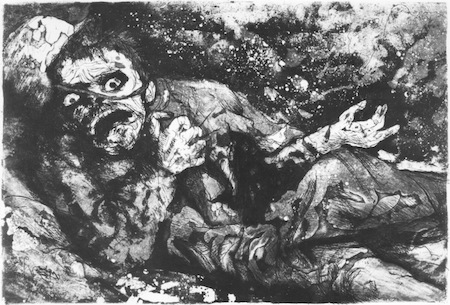War is a Dirty Business

Wounded soldier – Autumn 1916, Bapaume by Otto Dix (1924).
Originally posted on the Huffington Post.
When's the last time our media covered war honestly? When's the last time you saw combat footage of American troops under fire, or of American troops killing others in the name of keeping us safe from enemies? When was the last time you saw an American soldier panicking, firing wildly, perhaps killing members of his own unit (fratricide) or innocent civilians caught in the crossfire of war? Maybe in the 1960s during coverage of the Vietnam War?
War is not glorious. It may feature noble deeds and remarkable sacrifices, but it also features brutality and many other bloody realities. War breaks men (and women) down. It does so because war is unnatural. Yes, war is many things, but it most certainly is about killing. Occasionally, the killing is even necessary. (Just ask those enslaved by the Nazis or the Japanese whether they greeted Allied troops as liberators.)
War should never be debated in the abstract; it's only at our own peril when we reduce it to mindless entertainment. We must always remember how hideous the face of war can be, and how pitiless it is to those caught in its path of destruction.
To young men unaccustomed to its horrors, even training for war can be shocking. Consider the following letter from my father, who was in an armored unit during World War II. In April 1943, my dad wrote from Camp Young, California, about his training at the Army's Desert Training Center:
All the companies have to go through a battle inoculation [indoctrination] course which consists of crawling over the ground and having machine guns firing over your head. Every so many feet, charges of dynamite are set off to simulate cannon fire. Nobody has been hurt but a few fellows have had cases of hysteria and anxiety and crying spells. By going through this course they can tell how you react under fire. In that way they can weed out the unfit. Those fellows that begun hysterical would probably become shell-shocked in actual fighting conditions.
Even under "safe" training conditions, it just isn't natural to have machine gun rounds whizzing around your head while dynamite charges explode a dozen or so yards away. Most troops eventually got "inoculated," as my dad put it, but a few found even this simulation to be too nerve-shattering for them.
Those few trainees who were "hysterical" -- those few who apparently lacked the moral fiber (as they used to say in Britain) to endure bullets and bombs even in training -- they remind us that war is traumatic, that war is unnatural, that war is shattering to minds as well as hearts.
War is an exercise in concrete realities, kill or be killed, him or me. Let's stop talking about it as if it's ennobling. Let's stop glorifying it in movies. And let's stop treating it like a game.
